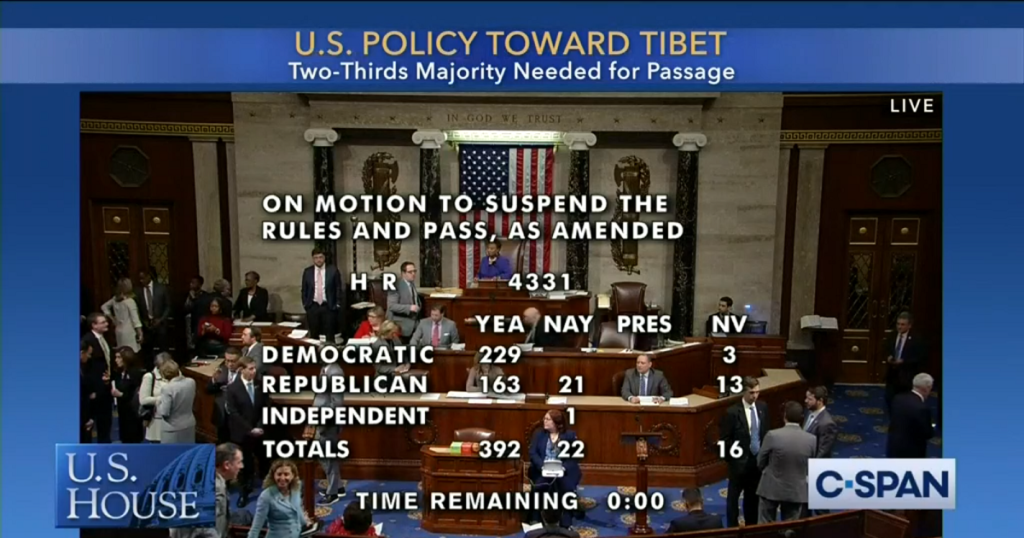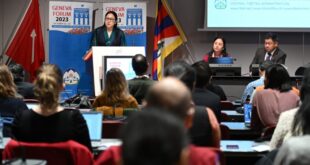
The US House of Representatives passed the Tibetan Policy and Support Act with a supermajority of 392 votes in support.
Washington DC: In yet another landmark victory for Tibetans and Tibet supporters around the world, the US House of Representatives today overwhelmingly passed the Tibetan Policy and Support Act (HR 4331), the most comprehensive policy bill on Tibet since the Tibet Policy Act- 2002.
The supermajority vote on the legislation is a landmark show of support by the US for the Central Tibetan Administration, the Middle Way Policy and genuine autonomy for Tibetans, religious freedom, environmental protection of Tibetan plateau and restoration of freedom in Tibet.
“On behalf of six million Tibetans I extend profound gratitude to the Chairs of the Congressional-Executive Commission on China and to all the co-sponsors for supporting the Tibetan Policy and Support Act,” CTA President Dr Lobsang Sangay said.
The President especially thanked Speaker Nancy Pelosi, Congressman Jim McGovern(D-Mass.), Congressman Chris Smith(R-NJ) and a longtime Tibet supporting Republican Congressman Ted Yoho who spoke strongly in support of the bill in the House as well as others.
President Dr Sangay was in Washington DC in September and November last year drumming up support for the bill and met with 21 Senators and Congresspersons Including Speaker Nancy Pelosi, Congressman Jim McGovern, Congressman Ted Yoho, Congressman Andy Levin, Congressman Vern Buchanan, Congressman David Price, Congresswoman Judy Chu, Congresswoman Terri Sewell, Congressman Gerry Connolly, Congressman Ron Wright and Congressman Tim Burchett, Senator Mitt Romney, Senator James Risch, Senator Dianne Feinstein, Senator Marco Rubio, Senator Tom Cotton, Senator Josh Hawley, Senator Steve Daines, Senator Thom Tillis and Senator Pat Toomey.
“Thanks to everyone who have worked towards this important landmark.” The President had written to all 535 members of Congress and senators through the Office of Tibet, Washington DC to urge their support.
Speaking on the House floor earlier today, the Chairman of the Congressional-Executive Commission on China, Congressman Jim McGovern, who introduced the bill in House, stated, “The Central Tibetan Administration represents the legitimate aspirations of the Tibetan people” and recounted how China is the most prominent human rights abuser. “It should be clear that we support a positive and productive US-China relationship but it is essential that human rights of all the people of China are respected by their government.”
Congresswoman Eleanor Holmes Norton said: “The US will not cease to help Tibetan people until they get freedom”.
Congressman Ted Yoho reaffirmed that the Tibetan issue has and will continue to attract bi-partisan support, and he promoted his place to invite His Holiness the Dalai Lama to address members of Congress through a video conference.
Congressman Tom Suozzi mentioned his involvement with China Commission Town Hall meeting with the Tibetan community in New York last year and stated, “Attacks on religious freedom anywhere is an attack everywhere”.
Finally, Speaker Pelosi graciously came to support the bill.
“As Sikyong Dr Lobsang Sangay, the president of the Central Tibetan Administration has said, the very survival of Tibetan culture and identity is in peril. If we don’t speak out for human rights in China because of commercial interest, then we lose all moral authority to speak out for human rights anyplace in the world,” quoted Speaker Pelosi.
“We are supporting the Tibetan people’s right to religious freedom and genuine autonomy by formally establishing a US policy that the Tibetan Buddhist community has the exclusive right to choose its religious leaders, including the future 15th Dalai Lama,” she said.
The bill was passed with a supermajority of 399 votes.
Built on the Tibetan Policy Act of 2002, the bill was introduced in the US House on 13 September 2019 by Rep. James McGovern (D-Mass.), chair of the Congressional-Executive Commission on China, and introduced in the Senate on 24 September by the commission’s Co-Chair Sen. Marco Rubio (R-Fla.) and Senator Ben Cardin. The bill has 35 bipartisan co-sponsors.
“This is an extremely significant and empowering day for Tibetans all over the world. We are grateful for the House of Representatives for standing up for the human rights of Tibetan people, as this is strong and clear support of truth, justice, and human rights. It also sends a strong message to the Chinese Government about the US government’s sentiments for Tibet, Tibetans, and human rights. We are confident that the bill will pass through the Senate and move to become a historic Act on Tibet”, stated Representative Ngodup Tsering.
Earlier that morning, Representative Tsering and Kelsang met with Congressman McGovern and discussed the bill. The four staff members of the Office of Tibet, including the Representative, attended the entire proceedings of the House.
The next step is to go through the Senate where there is a significant show of support for the smooth passage. After the Senate, it will be sent to President Trump to be signed and become law. Read the text of the bill.
Statement of Policy on Reincarnation of Dalai Lama
The bill makes it official US policy that the decisions regarding the ‘identification’ and ‘installation’ of Tibetan Buddhist religious leaders, including the future 15th Dalai Lama are but exclusively the right of appropriate religious authorities within Tibetan Buddhist tradition under the guiding instructions of the 14th Dalai Lama. With this bill, the US sends a clear message that Chinese government officials who are complicit identifying and installing a government-approved candidate as the future 15th Dalai Lama are liable for sanctions as described in the amendments including visa restrictions on Chinese officials under Immigration and Nationality Act of the U.S.
The policy also denotes that meddling by the Govt. of China or any government, for instance, in the matter concerning recognising a successor of Dalai Lama will be deemed as a ‘clear violation of the fundamental religious freedoms of Tibetan Buddhists and the Tibetan people’.
Moreover, the policy states that the funds available to the Department of State for international religious freedom programs, the Ambassador-at-Large for International Religious Freedom should provide funding to vigorously protect and promote international religious freedom in China and for programs to protect Tibetan Buddhism in China and elsewhere.
Recognition of Central Tibetan Administration and Celebration of Tibetan Democracy-in-Exile
The bill recognizes the Central Tibetan Administration as a legitimate representative that reflects the aspirations of Tibetan people around the world and the Sikyong as the Chief Executive of the Central Tibetan Administration; noting the role of the Dalai Lama in the establishment of a democratic polity which has been 70 years in the making. From the formation of people’s representatives in 1960 that is known today as the parliament to the first direct election for the Chief Executive of the CTA, Professor Samdhong Rinpoche,and His Holiness the Dalai Lama’s devolution of political powers to the Sikyong in 2011. The bill not only enumerates this chronology but also commends the efforts of His Holiness the Dalai Lama, CTA and the Tibetan community in exile for the establishment of a self-governing democratic system with free and fair elections across the exile community.
This bill further emphasises that the six million Tibetans living in Tibet do not have a political representative and renders support to CTA’s Middle Way Approach for resolving the Tibet issue and considers it a ‘genuine demand for autonomy’.
It is significant in its citation of the ‘Section 355 of the Foreign Relations Authorization Act, Fiscal Years 1992 and 1993’ recognising the Dalai Lama and the CTA as the legitimate representative of the Tibetan people, and supports Tibet’s historical status as a sovereign nation with a separate political and territorial identity from China, and acknowledges its distinct national, cultural and religious identity.
The bill concludes with the following suggestion: “as consistent with section 621(d)(3) of the Tibetan Policy Act of 2002 (22 U.S.C. 6901 note), the United States Special Coordinator for Tibetan Issues should continue to maintain close contact with the religious, cultural, and elected leaders of the Tibetan people”.
It also lauds the Tibetan administration and the people for leading a ‘model democratic system’ that others can follow.
Preservation of Tibetan Plateau
The bill recognizes the key role of Tibetan plateau, often called as the third pole, in determining global climate change. The change in temperature of Tibetan plateau impacts the glaciers, the monsoon cycle and the flow of rivers. Around 1.8 billion people are dependent on the freshwater supplied by the Tibetan rivers. But the so-called developmental activities by the Chinese government including the continuous damming of the Tibetan rivers for the Chinese hydroelectric power, the continuous diversion of rivers and the coerced resettlement of Tibetan nomads who often play the role of environmental stewardship have led to environmental degradation of the Tibetan plateau.
The legislation, therefore, calls for collaborative efforts to monitor the environment on the Tibetan plateau and also calls for participation of Tibetan nomads and other Tibetan stakeholders in preservation of the Tibetan plateau. Most importantly the bill calls for cooperative agreements among all riparian nations for transparency related to any kind of activities on rivers flowing from Tibetan plateau.
Diplomatic Channels
To promote access to Tibet as enumerated in the Reciprocal Access to Tibet Act, 2019, the bill mandates for the establishment of US Consulate in Lhasa, the capital of Tibet. Until such establishment, the bill mandates the creation of a separate Tibet section at the US Embassy in Beijing which shall monitor the political, economic and social development in Tibet. As a matter of policy, the bill calls upon the Secretary to not authorize any new Chinese consulate in the US.
Tibetans, friends of Tibet, and supporters of democracy and human rights will be rooting for the passage of the Tibetan Policy and Support Act of 2019 into law.
-with inputs from Office of Tibet, DC



